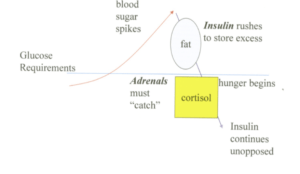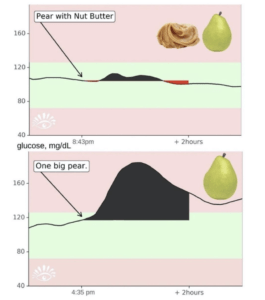Blood Sugar, Weight Loss, and the Functional Nutrition Approach
So here is the thing, being in a calorie deficit is ultimately what leads to weight loss, right?
And my answer to that is, well… maybe.
In many cases, I would say yes. Strictly speaking, you must eat less than what you are burning to lose weight. It is just science. So why do we see so many clients come to us who are severely under-eating, and they aren’t losing weight? Some of them even GAINING weight? ? Where does the role of a calorie deficit play into that?
I have a three-word answer. Blood sugar balance.
Most of the time, when clients cut their calories down so low, they are surviving off fruits, popcorn, various greens powders and the occasional lean protein or granola bar. Now these are all relatively low-calorie foods, so they should help us reach our weight loss goals, right?
Unfortunately, the equation is a bit more complex than that.
Let me start by explaining a bit more as to what blood sugars are and why keeping them in balance may be the reason you’re not losing weight, yes even in a calorie deficit!
Carbohydrates are the macronutrient most easily converted to sugar in our bodies, so when we ingest carbs on their own, it causes a rapid rise in overall blood sugar. Elevated blood sugar causes insulin to rise; insulin is our fat storage hormone and due to the excess of sugar circulating in the blood, it wants to come in to take those to storage in the liver or fat.

Fat contains more than double the calories of carbs or proteins so in diets, it is usually the first to go. However, by cutting out fat, we may be reducing the overall amount of calories we are eating, but in turn we are sending our body on a blood sugar rollercoaster. By adding a fat source to each meal, this helps slow digestion of the whole meal leaving us not only feeling fuller and more satisfied, but also keeping our blood sugar levels more stable. Which in turn, minimizes the amount of insulin our body releases leading to less fat storage and weight loss.

Figure 1 From: Danielle Hamilton Health
It seems counterintuitive to add calories in order to lose weight, but fat does NOT make you fat! Since the 1960s, “experts” have been advising people to eat less fat based on the assumption that fat makes you fat, however, obesity rates are now higher than ever (1). According to a Harvard study, “low-fat foods brought to market over the past 40 years – high in refined carbohydrates – actually raise our insulin levels, trigger our fat cells to hoard calories, slow our metabolism and make us hungrier (2).”
Are you interested in learning more about weight loss resistance and how your blood sugar could be affecting you? Book a free 30-minute call here to talk to someone on our team!

Rachel Scheer is a Certified Nutritionist who received her degree from Baylor University in Nutrition Science and Dietetics. Rachel has her own private nutrition and counseling practice located in McKinney, Texas. Rachel has helped clients with a wide range of nutritional needs enhance their athletic performance, improve their physical and mental health, and make positive lifelong eating and exercise behavior changes.
Read This Next
Micronutrients, or the vitamins and minerals your body needs, typically work like a team. To…
If you want to improve gut health, or even optimize your overall health, you’ve probably…
Have you ever found yourself grappling with the discomfort of abdominal distension, bloating, or cramping,…



